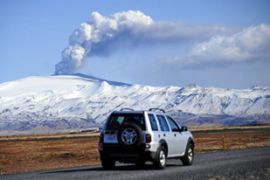Airlines count volcano chaos cost
Revenue lost due to grounded flights estimated at $1.7bn as air traffic returns to normal.

“For an industry that lost $9.4bn last year and was forecast to lose a further $2.8bn in 2010, this crisis is devastating,” Giovanni Bisignani, the Iata chief, said.
Bisignani said an extraordinary situation had been exacerbated by “poor decision-making” from governments, which he said now need to look at how to compensate the airlines.
“I am the first one to say that this industry does not want or need bail-outs. But this crisis is not the result of running our business badly,” he said.
Clearing backlog
Even though air traffic has resumed, airlines are still struggling to clear a backlog of passengers and cargo after about 100,000 flights were cancelled in the last week.
The ash cloud from a volcano eruption on Iceland caused air-traffic authorities across Europe to close airspace and millions of people were affected.
| Special report | |
|
Several airline executives, including Willie Walsh, the British Airways chief, have questioned if the long-lasting shutdowns were really necessary.
“I don’t believe it was necessary to impose a blanket ban on all UK airspace last Thursday,” he said.
“My personal belief is that we could have safely continued operating for a period of time.”
Michael O’Leary, Ryanair’s chief executive, condemned what he called the slow response by authorities.
|
Airlines say the ash chaos cost them $1.7bn |
“It might have made sense to ground flights for a day or two. That’s understandable. But there should have been a much faster response by the governments, the transport ministers and the regulators,” he said.
One vulcanologist advising the United Nations said the authorities had had no choice but to close their airspace because of the lack of hard facts about aircraft behaviour in volcanic ash.
“There is at the moment no reliable data on the exact concentration of ash in the atmosphere and when an aircraft can fly, or not, through such plumes,” Henry Gaudru, president of the European Vulcanological Society, said.
In Iceland, the volcano under the Eyjafjallajokull glacier remained active on Wednesday, throwing huge magma chunks into the air, spewing lava and producing tremors.
But it was not shooting ash and smoke six to 10 kilometres into
the air like it did previously.
